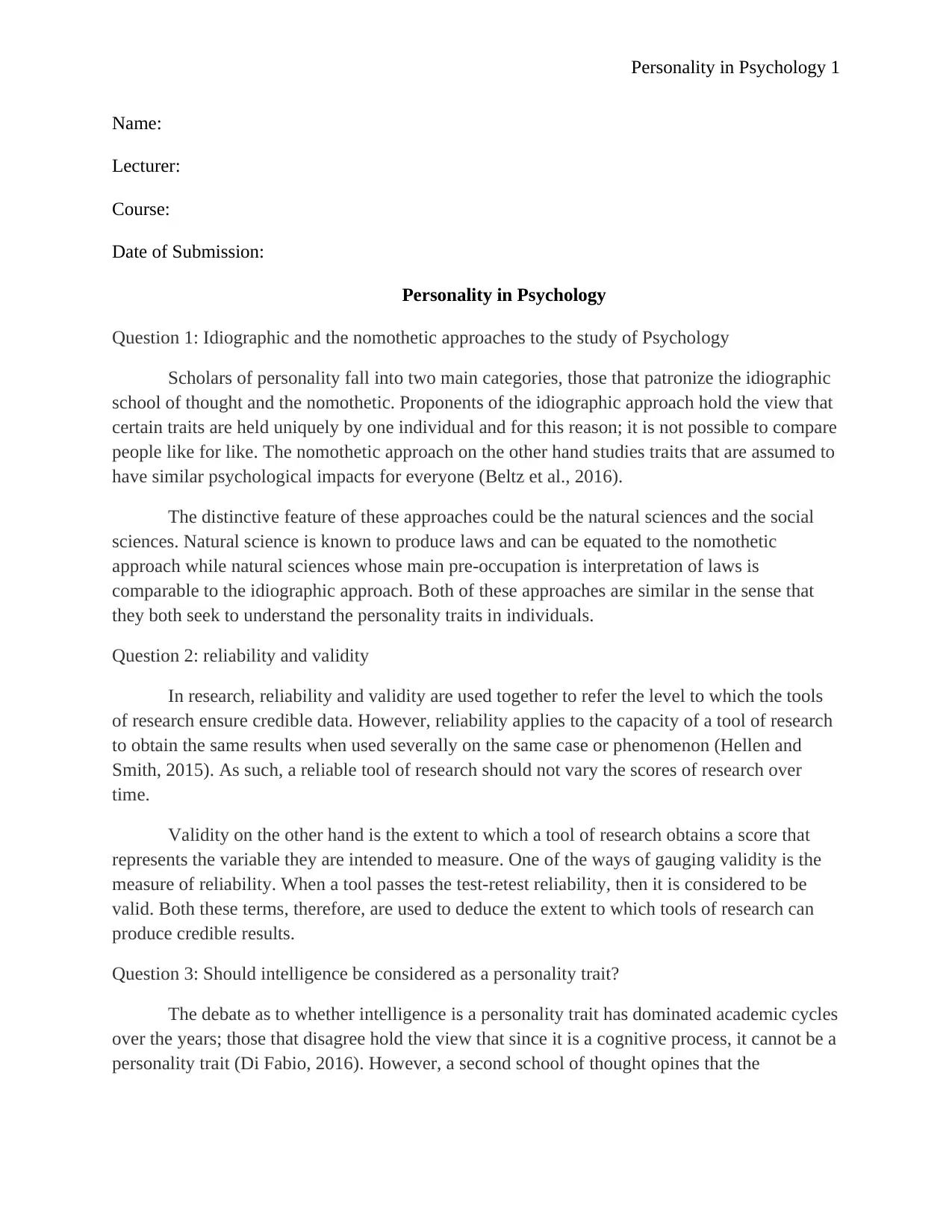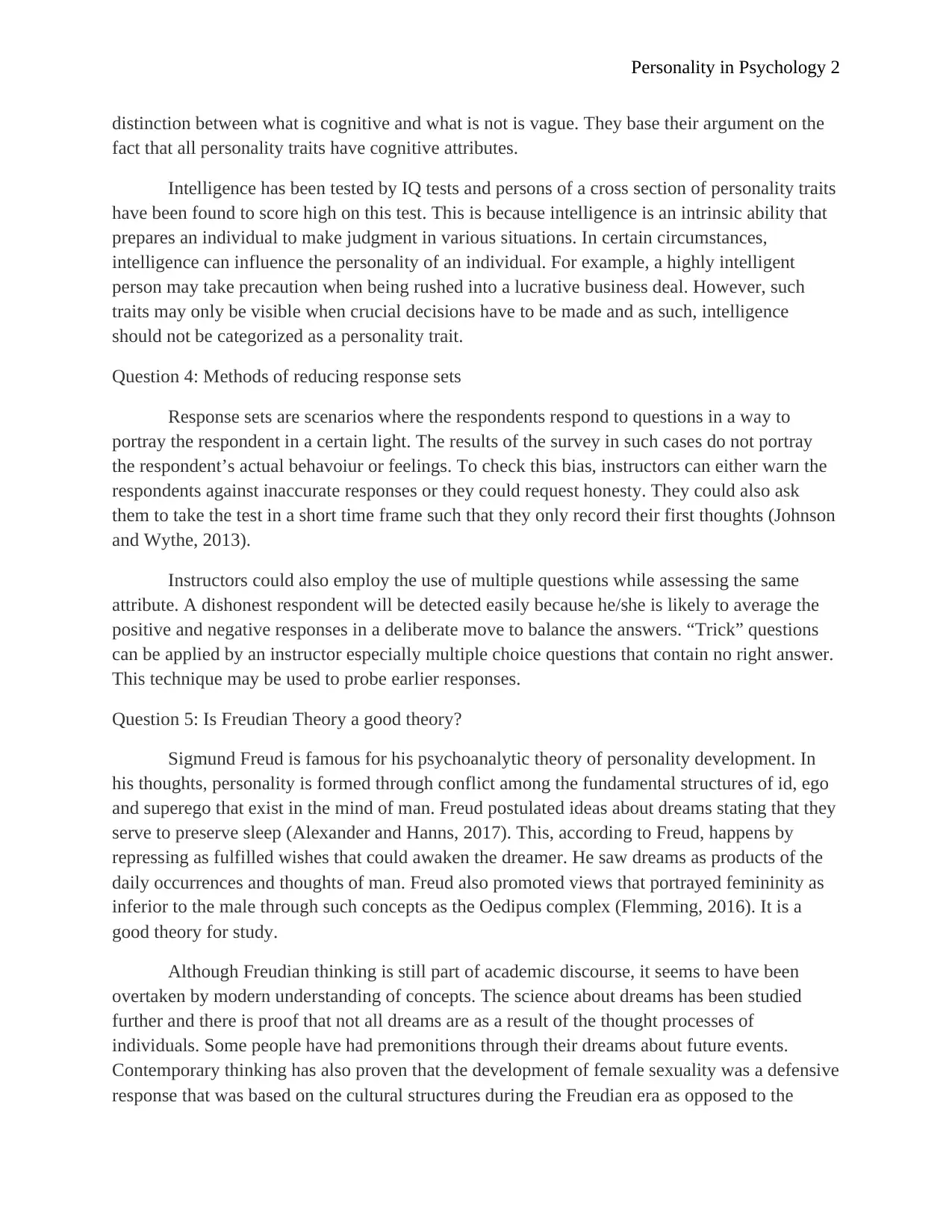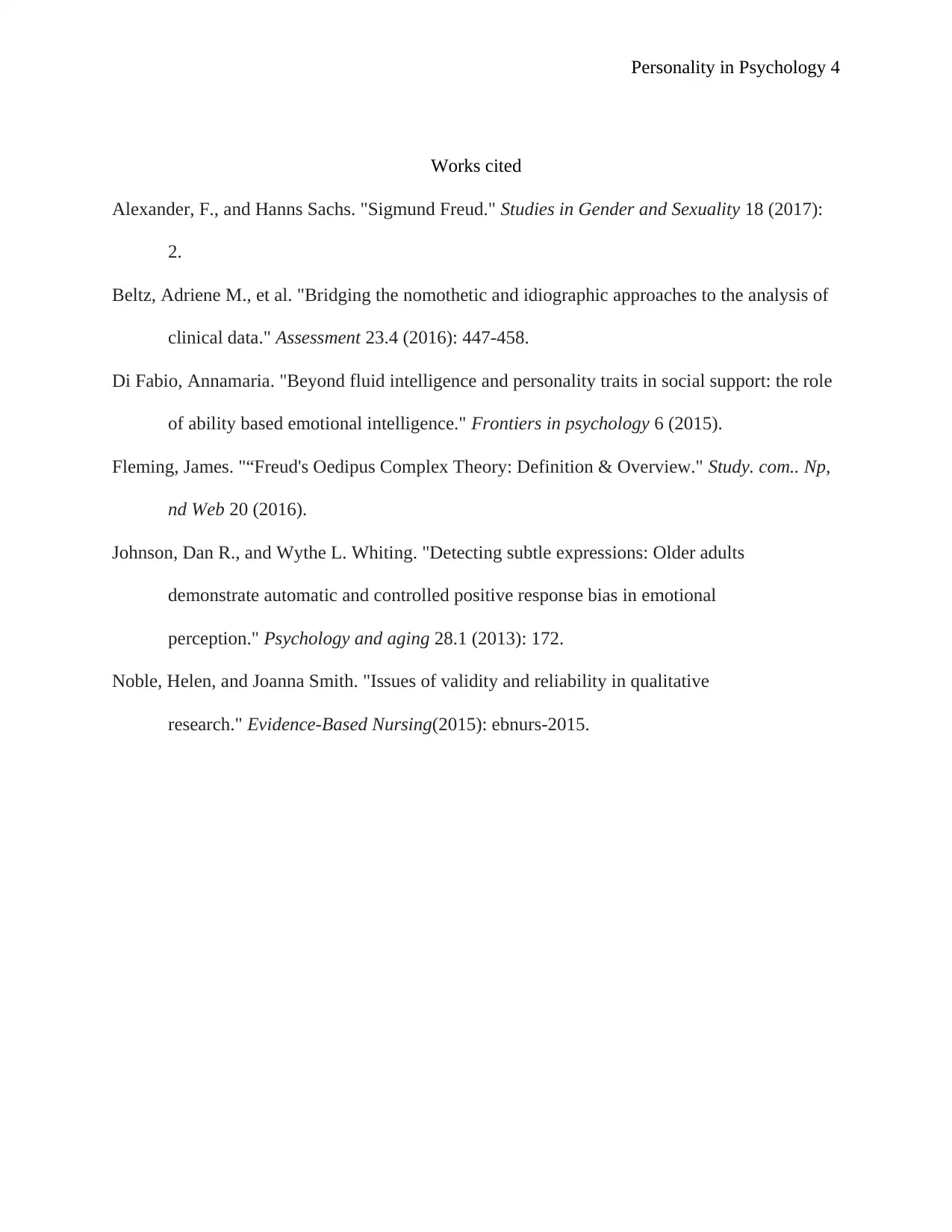University Psychology: Personality Theories, Concepts, and Research
VerifiedAdded on 2020/05/11
|5
|1202
|53
Homework Assignment
AI Summary
This psychology assignment delves into various aspects of personality. It begins by comparing the idiographic and nomothetic approaches to personality study, highlighting their differing perspectives on individual traits. The assignment then examines reliability and validity in research, emphasizing their importance in ensuring credible data. Furthermore, it explores the debate around whether intelligence should be considered a personality trait. The solution also discusses methods for reducing response sets in surveys and provides an analysis of Freudian theory, evaluating its strengths and weaknesses, and its continued relevance in modern psychology. The provided references support the arguments and concepts discussed throughout the assignment.

Personality in Psychology 1
Name:
Lecturer:
Course:
Date of Submission:
Personality in Psychology
Question 1: Idiographic and the nomothetic approaches to the study of Psychology
Scholars of personality fall into two main categories, those that patronize the idiographic
school of thought and the nomothetic. Proponents of the idiographic approach hold the view that
certain traits are held uniquely by one individual and for this reason; it is not possible to compare
people like for like. The nomothetic approach on the other hand studies traits that are assumed to
have similar psychological impacts for everyone (Beltz et al., 2016).
The distinctive feature of these approaches could be the natural sciences and the social
sciences. Natural science is known to produce laws and can be equated to the nomothetic
approach while natural sciences whose main pre-occupation is interpretation of laws is
comparable to the idiographic approach. Both of these approaches are similar in the sense that
they both seek to understand the personality traits in individuals.
Question 2: reliability and validity
In research, reliability and validity are used together to refer the level to which the tools
of research ensure credible data. However, reliability applies to the capacity of a tool of research
to obtain the same results when used severally on the same case or phenomenon (Hellen and
Smith, 2015). As such, a reliable tool of research should not vary the scores of research over
time.
Validity on the other hand is the extent to which a tool of research obtains a score that
represents the variable they are intended to measure. One of the ways of gauging validity is the
measure of reliability. When a tool passes the test-retest reliability, then it is considered to be
valid. Both these terms, therefore, are used to deduce the extent to which tools of research can
produce credible results.
Question 3: Should intelligence be considered as a personality trait?
The debate as to whether intelligence is a personality trait has dominated academic cycles
over the years; those that disagree hold the view that since it is a cognitive process, it cannot be a
personality trait (Di Fabio, 2016). However, a second school of thought opines that the
Name:
Lecturer:
Course:
Date of Submission:
Personality in Psychology
Question 1: Idiographic and the nomothetic approaches to the study of Psychology
Scholars of personality fall into two main categories, those that patronize the idiographic
school of thought and the nomothetic. Proponents of the idiographic approach hold the view that
certain traits are held uniquely by one individual and for this reason; it is not possible to compare
people like for like. The nomothetic approach on the other hand studies traits that are assumed to
have similar psychological impacts for everyone (Beltz et al., 2016).
The distinctive feature of these approaches could be the natural sciences and the social
sciences. Natural science is known to produce laws and can be equated to the nomothetic
approach while natural sciences whose main pre-occupation is interpretation of laws is
comparable to the idiographic approach. Both of these approaches are similar in the sense that
they both seek to understand the personality traits in individuals.
Question 2: reliability and validity
In research, reliability and validity are used together to refer the level to which the tools
of research ensure credible data. However, reliability applies to the capacity of a tool of research
to obtain the same results when used severally on the same case or phenomenon (Hellen and
Smith, 2015). As such, a reliable tool of research should not vary the scores of research over
time.
Validity on the other hand is the extent to which a tool of research obtains a score that
represents the variable they are intended to measure. One of the ways of gauging validity is the
measure of reliability. When a tool passes the test-retest reliability, then it is considered to be
valid. Both these terms, therefore, are used to deduce the extent to which tools of research can
produce credible results.
Question 3: Should intelligence be considered as a personality trait?
The debate as to whether intelligence is a personality trait has dominated academic cycles
over the years; those that disagree hold the view that since it is a cognitive process, it cannot be a
personality trait (Di Fabio, 2016). However, a second school of thought opines that the
Paraphrase This Document
Need a fresh take? Get an instant paraphrase of this document with our AI Paraphraser

Personality in Psychology 2
distinction between what is cognitive and what is not is vague. They base their argument on the
fact that all personality traits have cognitive attributes.
Intelligence has been tested by IQ tests and persons of a cross section of personality traits
have been found to score high on this test. This is because intelligence is an intrinsic ability that
prepares an individual to make judgment in various situations. In certain circumstances,
intelligence can influence the personality of an individual. For example, a highly intelligent
person may take precaution when being rushed into a lucrative business deal. However, such
traits may only be visible when crucial decisions have to be made and as such, intelligence
should not be categorized as a personality trait.
Question 4: Methods of reducing response sets
Response sets are scenarios where the respondents respond to questions in a way to
portray the respondent in a certain light. The results of the survey in such cases do not portray
the respondent’s actual behavoiur or feelings. To check this bias, instructors can either warn the
respondents against inaccurate responses or they could request honesty. They could also ask
them to take the test in a short time frame such that they only record their first thoughts (Johnson
and Wythe, 2013).
Instructors could also employ the use of multiple questions while assessing the same
attribute. A dishonest respondent will be detected easily because he/she is likely to average the
positive and negative responses in a deliberate move to balance the answers. “Trick” questions
can be applied by an instructor especially multiple choice questions that contain no right answer.
This technique may be used to probe earlier responses.
Question 5: Is Freudian Theory a good theory?
Sigmund Freud is famous for his psychoanalytic theory of personality development. In
his thoughts, personality is formed through conflict among the fundamental structures of id, ego
and superego that exist in the mind of man. Freud postulated ideas about dreams stating that they
serve to preserve sleep (Alexander and Hanns, 2017). This, according to Freud, happens by
repressing as fulfilled wishes that could awaken the dreamer. He saw dreams as products of the
daily occurrences and thoughts of man. Freud also promoted views that portrayed femininity as
inferior to the male through such concepts as the Oedipus complex (Flemming, 2016). It is a
good theory for study.
Although Freudian thinking is still part of academic discourse, it seems to have been
overtaken by modern understanding of concepts. The science about dreams has been studied
further and there is proof that not all dreams are as a result of the thought processes of
individuals. Some people have had premonitions through their dreams about future events.
Contemporary thinking has also proven that the development of female sexuality was a defensive
response that was based on the cultural structures during the Freudian era as opposed to the
distinction between what is cognitive and what is not is vague. They base their argument on the
fact that all personality traits have cognitive attributes.
Intelligence has been tested by IQ tests and persons of a cross section of personality traits
have been found to score high on this test. This is because intelligence is an intrinsic ability that
prepares an individual to make judgment in various situations. In certain circumstances,
intelligence can influence the personality of an individual. For example, a highly intelligent
person may take precaution when being rushed into a lucrative business deal. However, such
traits may only be visible when crucial decisions have to be made and as such, intelligence
should not be categorized as a personality trait.
Question 4: Methods of reducing response sets
Response sets are scenarios where the respondents respond to questions in a way to
portray the respondent in a certain light. The results of the survey in such cases do not portray
the respondent’s actual behavoiur or feelings. To check this bias, instructors can either warn the
respondents against inaccurate responses or they could request honesty. They could also ask
them to take the test in a short time frame such that they only record their first thoughts (Johnson
and Wythe, 2013).
Instructors could also employ the use of multiple questions while assessing the same
attribute. A dishonest respondent will be detected easily because he/she is likely to average the
positive and negative responses in a deliberate move to balance the answers. “Trick” questions
can be applied by an instructor especially multiple choice questions that contain no right answer.
This technique may be used to probe earlier responses.
Question 5: Is Freudian Theory a good theory?
Sigmund Freud is famous for his psychoanalytic theory of personality development. In
his thoughts, personality is formed through conflict among the fundamental structures of id, ego
and superego that exist in the mind of man. Freud postulated ideas about dreams stating that they
serve to preserve sleep (Alexander and Hanns, 2017). This, according to Freud, happens by
repressing as fulfilled wishes that could awaken the dreamer. He saw dreams as products of the
daily occurrences and thoughts of man. Freud also promoted views that portrayed femininity as
inferior to the male through such concepts as the Oedipus complex (Flemming, 2016). It is a
good theory for study.
Although Freudian thinking is still part of academic discourse, it seems to have been
overtaken by modern understanding of concepts. The science about dreams has been studied
further and there is proof that not all dreams are as a result of the thought processes of
individuals. Some people have had premonitions through their dreams about future events.
Contemporary thinking has also proven that the development of female sexuality was a defensive
response that was based on the cultural structures during the Freudian era as opposed to the

Personality in Psychology 3
biological asymmetry as postulated by Freud. This theory has however provoked further study
into human development and will remain a point of focus for many years to come. Although
many of his ideas have been criticized, Freud’s theory is a good theory as most of his critics
haven’t provided revolutionary concepts opposing him. It is for this reason that Freudian theory
will continue to be a guide to modern psychoanalysts.
biological asymmetry as postulated by Freud. This theory has however provoked further study
into human development and will remain a point of focus for many years to come. Although
many of his ideas have been criticized, Freud’s theory is a good theory as most of his critics
haven’t provided revolutionary concepts opposing him. It is for this reason that Freudian theory
will continue to be a guide to modern psychoanalysts.
⊘ This is a preview!⊘
Do you want full access?
Subscribe today to unlock all pages.

Trusted by 1+ million students worldwide

Personality in Psychology 4
Works cited
Alexander, F., and Hanns Sachs. "Sigmund Freud." Studies in Gender and Sexuality 18 (2017):
2.
Beltz, Adriene M., et al. "Bridging the nomothetic and idiographic approaches to the analysis of
clinical data." Assessment 23.4 (2016): 447-458.
Di Fabio, Annamaria. "Beyond fluid intelligence and personality traits in social support: the role
of ability based emotional intelligence." Frontiers in psychology 6 (2015).
Fleming, James. "“Freud's Oedipus Complex Theory: Definition & Overview." Study. com.. Np,
nd Web 20 (2016).
Johnson, Dan R., and Wythe L. Whiting. "Detecting subtle expressions: Older adults
demonstrate automatic and controlled positive response bias in emotional
perception." Psychology and aging 28.1 (2013): 172.
Noble, Helen, and Joanna Smith. "Issues of validity and reliability in qualitative
research." Evidence-Based Nursing(2015): ebnurs-2015.
Works cited
Alexander, F., and Hanns Sachs. "Sigmund Freud." Studies in Gender and Sexuality 18 (2017):
2.
Beltz, Adriene M., et al. "Bridging the nomothetic and idiographic approaches to the analysis of
clinical data." Assessment 23.4 (2016): 447-458.
Di Fabio, Annamaria. "Beyond fluid intelligence and personality traits in social support: the role
of ability based emotional intelligence." Frontiers in psychology 6 (2015).
Fleming, James. "“Freud's Oedipus Complex Theory: Definition & Overview." Study. com.. Np,
nd Web 20 (2016).
Johnson, Dan R., and Wythe L. Whiting. "Detecting subtle expressions: Older adults
demonstrate automatic and controlled positive response bias in emotional
perception." Psychology and aging 28.1 (2013): 172.
Noble, Helen, and Joanna Smith. "Issues of validity and reliability in qualitative
research." Evidence-Based Nursing(2015): ebnurs-2015.
Paraphrase This Document
Need a fresh take? Get an instant paraphrase of this document with our AI Paraphraser

Personality in Psychology 5
1 out of 5
Related Documents
Your All-in-One AI-Powered Toolkit for Academic Success.
+13062052269
info@desklib.com
Available 24*7 on WhatsApp / Email
![[object Object]](/_next/static/media/star-bottom.7253800d.svg)
Unlock your academic potential
Copyright © 2020–2025 A2Z Services. All Rights Reserved. Developed and managed by ZUCOL.





